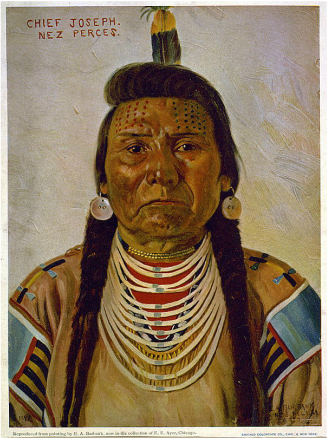You can find downloadable versions of these resources over on the C19th America blog HERE. If you want to find out more about Chief Joseph, I can highly recommend Elliot West's excellent book: The Last Indian War, or Ken Burns' documentary: The West.
 Chief Joseph / E.A. Burbank, 1897. Retrieved from the Library of Congress, https://www.loc.gov/item/97515744/.
Chief Joseph / E.A. Burbank, 1897. Retrieved from the Library of Congress, https://www.loc.gov/item/97515744/. Fight No More Forever
It was late Spring when Chief Joseph looked back over his beloved Wallowa Valley for the last time. The new, green leaves promised a beautiful summer to come. In the past they would have reminded Joseph of the hunting season on the Plains. This time, he saw them differently; fragile and temporary, soon to fall in the stiff Autumn breezes. They reminded him that nothing, not even his own homeland could last forever, and that soon his own people would fall like the leaves in the gale of white settlement.
Land and exploitation
The Nez Perce had historically had good relations with white explorers and settlers, but decades of settlement since the 1840s had strained the relationship as whites came in search of the American Dream. Tensions rose further still when gold was discovered in the 1860s.
In 1863, the government demanded the Nez Perce sign a new treaty, giving away 90% of their lands, including the Wallowa valley. The Nez Perce were divided over the treaty and many refused to move to the reservation. When Joseph became the chief of the Wallowa Nez Perce in 1871, he also refused to give up his ancestors’ vision of a free-ranging life. But this lifestyle was increasingly leading to conflict with white settlers who feared the presence of the Nez Perce, or wanted access to the gold fields.
In 1877 Joseph was called to a meeting with the US Army General, Oliver Otis Howard. Howard had already written to his superiors to say “I think it is a great mistake to take from Joseph and his band of Nez Perce Indians that valley...and possibly [should] let these really peaceable Indians have this poor valley for their own.” The government were not convinced. Joseph in turn repeated his stock response, that the land was the home of his people and not his to sell. Howard could almost see the writing on the wall when he came to the meeting with Joseph, but Joseph would not sell the land.
An unwanted conflict


 RSS Feed
RSS Feed
